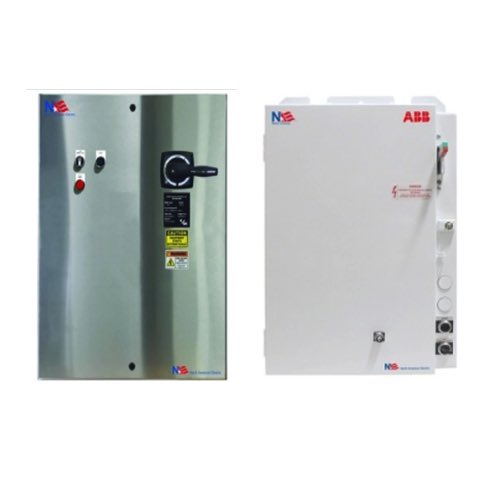NAE Motor Starters

NAE motor starters are designed to provide dependable motor control and protection in industrial applications where reliability and longevity are critical. These starters manage the electrical power supplied to a motor, ensuring safe startup and shutdown while protecting against overloads and electrical faults. By controlling inrush current and monitoring operating conditions, NAE motor starters help maintain consistent motor performance and system stability.
A motor starter receives incoming power and delivers it to the motor in a controlled and efficient manner. This process reduces mechanical and electrical stress during startup and stopping, helping to prevent premature wear on motor components. NAE motor starters are engineered to prevent motors from operating under unsafe conditions, supporting extended motor life and improved protection for connected equipment.
NAE motor starters are compatible with a wide range of motor types, including washdown-duty motors and motors designed for harsh or demanding environments. Their rugged construction and dependable operation make them suitable for industrial facilities where consistent uptime and equipment protection are essential. When paired with appropriate motor protection and control components, NAE motor starters support efficient and long-term system operation.
FAQs
Q: What is an NAE motor starter used for?
An NAE motor starter is used to safely start and stop an electric motor while providing protection against overloads and electrical faults.
Q: How does a motor starter protect a motor?
Motor starters include overload protection and control components that prevent motors from operating under unsafe current or fault conditions.
Q: Are NAE motor starters compatible with harsh environments?
Yes, they are designed to work with motors used in harsh or washdown-duty environments and support reliable operation in industrial settings.
Q: What is the difference between a motor starter, soft starter, and VFD?
Motor starters provide basic start/stop control and overload protection, soft starters reduce inrush current during startup, and VFDs offer full speed and torque control throughout operation.
Q: Can NAE motor starters be used with additional motor control components?
Yes, NAE motor starters can be integrated with auxiliary contacts, controls, and gear reducers to support monitoring, efficiency, and durability.
Why Buy NAE Motor Starters for Reliable Motor Control and Protection from RSP Supply
RSP Supply offers a full selection of NAE motor starters designed to support safe, efficient, and reliable motor operation in industrial applications. Our motor starter solutions provide dependable protection, compatibility with a wide range of motors, and proven performance in demanding environments. Customers rely on RSP Supply for quality motor control components, technical expertise, and solutions built to support long-term system reliability.

